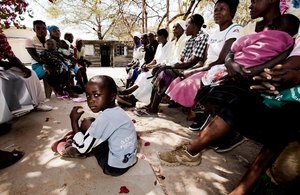DFID Research: Tuberculosis: WHO-Endorsed Test Offers Rapid Detection
A systematic review of Xpert® MTB/RIF confirms the diagnostic accuracy of this TB test, and its ability to replace culture-based sensitivity testing. This provides authoritative underpinning to WHO’s endorsement of Xpert® MTB/RIF. It’s the first Cochrane diagnostic test accuracy (DTA) systematic review on tuberculosis, carried out by a team with an international reputation in TB diagnostic test synthesis.

Picture: Elizabeth Glaser Pediatric AIDS Foundation
A diagnostic test for tuberculosis (TB) can accurately and quickly detect both TB and drug-resistant strains, according to a new study. The authors of a new systematic review assessing the diagnostic accuracy of the Xpert® MTB/RIF test published in The Cochrane Library say their study can provide timely advice for clinicians and policymakers in countries where TB is a major public health problem.
Millions of people develop TB every year. Around 13% of cases occur in people living with HIV and more than a quarter of these people die as a result. Drug resistance is a major public health problem that further complicates efforts to control TB. Multidrug-resistant TB is defined as resistance to rifampicin and isoniazid, which are two of the most effective and widely used anti-TB drugs. Xpert® (Cepheid Inc, California) is a diagnostic test endorsed by the World Health Organization (WHO) that simultaneously detects TB and resistance to rifampicin, as an indicator of multidrug resistance. The test takes around two hours, with minimal hands-on technical time required.
Like sputum smear microscopy, which relies on detecting TB with a microscope in a laboratory, Xpert requires a sample of sputum. However, while thousands of bacteria must be present in each millilitre of sample for TB to be detected under the microscope, Xpert can detect TB bacteria at much lower concentrations. In addition, the conventional microscopy approach does not detect drug resistance. Instead, TB has to be grown in the lab. This presents problems, especially for multidrug-resistant TB, due both to the length of time required for the cultures to grow and the specialized laboratories and highly skilled staff needed.
The researchers, from the Cochrane Infectious Diseases Group, McGill University and the Foundation for Innovative New Diagnostics (FIND), analysed data from 18 studies involving a total of 7,816 people, with most studies being carried out in low- and middle-income countries. The results show that when Xpert is used to screen 1,000 people, 150 of whom have TB, it picks up 132 of the 150 cases (88%) and falsely diagnoses 17 (2%) with TB. This is in a scenario where it is being used as a replacement for smear microscopy. In a scenario where Xpert is being used as a replacement for culture-based drug susceptibility testing, it is also able to detect the equivalent of 141 out of 150 cases (94%) of rifampicin resistance. When Xpert is used as a follow-on test, after conventional smear microscopy has already produced a negative result, it picks up 101 out of 150 cases (67%). By definition, smear-negative TB is not picked up by smear microscopy because microscopy cannot detect small numbers of bacteria. Xpert picked up 67% of this group that would have been missed by microscopy.
“This study represents the most comprehensive review on the diagnostic accuracy of Xpert to date and may help countries make decisions about scaling up its use for management of TB and drug-resistant TB,” said lead researcher, Karen Steingart, of the Cochrane Infectious Diseases Group.
Karin Weyer, Coordinator, Laboratories, Diagnostics and Drug Resistance at the World Health Organization (WHO) said, “This Cochrane Review provides high quality evidence that reinforces WHO’s endorsement of this test. Recent price reductions have greatly facilitated roll-out of this technology, including a new three-year initiative called the TB Xpert Project, funded by UNITAID and executed by WHO and the Stop TB Partnership. 1.4 million test cartridges and over 200 GeneXpert instruments for the rapid detection of TB and rifampicin resistance will be distributed in 21 countries with a high burden of TB.”
Lucica Ditiu, Executive Secretary of the Stop TB Partnership, said, “We welcome the Cochrane Review of Xpert, an innovation that represents a major milestone in our quest to achieve the goal of zero deaths from TB - which is curable but still takes the life of three people every minute. The Stop TB Partnership is making every effort to help countries understand how best to use this new technology. Our TB REACH initiative is deploying Xpert to numerous countries through projects that seek to increase the number of TB cases detected and treated, and these projects will deliver data that can provide an evidence base for determining how Xpert should be used for the greatest impact.”
**The Cochrane Infectious Diseases Group (CIDG)
**The Cochrane Infectious Diseases Group (CIDG) is a partner of the Effective Health Care Research Consortium, funded by the UK Government. The editorial base of the CIDG is located at the Liverpool School of Tropical Medicine. CIDG has been preparing systematic reviews on the benefits and harms of healthcare interventions for infectious diseases, particularly malaria, tuberculosis, diarrhoea, and tropical diseases, since 1994.